Hope, action, and resilience: The future of Nairobi’s informal settlements in the hands of young leaders
Hope, action, and resilience: The future of Nairobi’s informal settlements in the hands of young leaders
What do 30 young leaders from Muungano wa Wanavijiji, representing different informal settlements in Nairobi, envision for their communities, and how do they plan to get there? This blog co-authored by Sarah Ouma, Kevin Stanley Mburu, Lucia Scodanibbio, Christine Wambui, Jacob Omondi, Zizipho Royi, explores the inspiring visions these young people shared at a recent knowledge brokering workshop, highlighting their commitment to driving change. Discover how they plan to transform their communities in the short, medium, and long term, building a more equitable and sustainable future for all.
What do 30 young leaders from Muungano wa Wanavijiji, representing different informal settlements in Nairobi, envision for their communities, and how do they plan to get there?
This is the final question we asked the participants of the knowledge brokering learning workshop that Slum Dwellers International Kenya and CDKN convened in February 2025. The workshop brought together community health promoters, climate champions, co-researchers, and creatives from Mukuru, Mathare, Kibera, and Huruma informal settlements. Their work involves advancing basic services, land, housing, and livelihoods through community-based research, data translation, and stakeholder engagement. Although it was the first time most of them had heard the term knowledge brokering, they readily identified with it, shared multiple experiences of being knowledge brokers, and adopted the concept as their own.
By the end of the workshop, participants applied their newly acquired skills and knowledge to share their inspiring visions of what they would like to achieve in three years and how they would get there, within three months and three days.
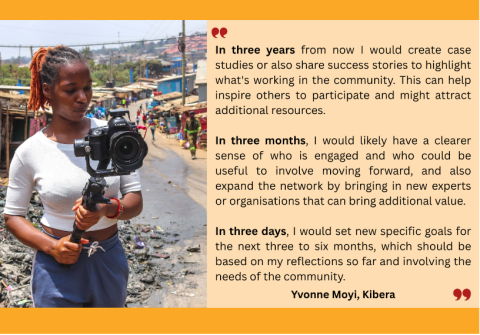
Long-term visions: Where do you see yourselves in three years?
Many participants stated that they would utilise every opportunity to apply their knowledge brokering skills to work with their communities and other stakeholders, aiming for long-lasting, tangible impacts that encourage equity, equality, and inclusivity in their projects and meetings. They voiced plans to organise continuous and inclusive community engagements using co-creation to foster good relations between stakeholders and community members.
The young people who attended the workshop see themselves as trusted intermediaries who can connect problems with solutions. They discussed networking to help their communities kick-start, develop, and implement self-initiated, sustainable programmes that would improve livelihoods. Philip Makuha, from Huruma, shared his idea of forming a network for different communities to learn from each other through a series of exchange programmes. Charles Chege, from Kiamaiko, also discussed strengthening networks with other civil society organisations to enhance funding for community projects, aiming to help eradicate poverty. Jarvis Kasandi from Kibera shared his vision;
“In three years, I want to be a trusted connector, breaking silos and building networks that facilitate real-world solutions. My goal is to drive meaningful change by effectively transferring knowledge between researchers, policymakers, and practitioners.”
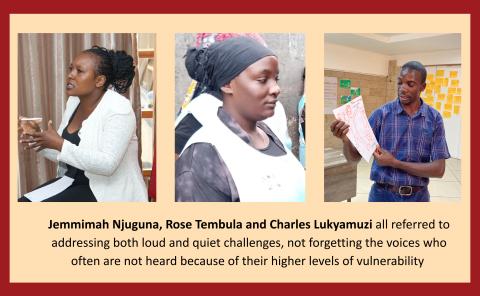
The young leaders talked about being attentive to and solving at least some of the “loudest” and “quietest” challenges in their communities (referring to those voices that are more marginalised and can therefore remain unheard). Ivine Omondi, from Mathare, mentioned that after mapping out the key players that deal with vulnerable members of his community (e.g., people with disabilities), in three years he would have assessed their needs, co-designed opportunities to better their livelihoods (e.g., a disability-friendly bridge), and come up with an action plan to address those needs together. Bulenza Sirezi, from Uganda, would like to see enhanced access to climate-resilient basic services for informal communities in both urban and rural areas beyond his country. Charles Chege proposed setting up community disaster response teams to enhance community resilience and adaptability, and introducing mental health studies and disaster management (climate change) in the school curriculum.
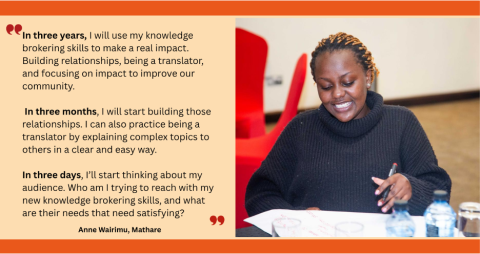
Jamila Vujeta and her colleagues from the Foundation of Hope want to build a continuously growing, self-sustaining climate action organisation or network that runs a well-established climate knowledge hub, educating thousands, and ongoing large-scale environmental projects improving local sustainability. Building on their research, networks, education and community mobilisation, they also want to create policy changes and business transformations that will lead to visible climate solutions and long-term resilience.
The participants stated their intentions to call duty bearers (government officials) to action and strategise about collaborating with people in power, such as gatekeepers. While Ivine suggested holding formal conversations with them, Charles proposed creating community desks and community policing offices to help address any emerging and burning issues, and avoid going through gatekeepers to solve problems. An idea voiced numerous times was creating safer spaces for everyone in the community to come and express their issues and concerns.
The participants also referred to their knowledge translator roles and how they want to clearly and easily explain complex topics to others. They plan to achieve this by simplifying language and removing jargon, ensuring their work is understandable across different language groups. They will also raise awareness and advocate through various forms of art, such as music, skits, poetry, and fashion, and by using sign language and braille to promote local talent and improve literacy.
Yvonne Moyi, from Kibera, aims to create and share case studies and success stories that highlight what is working in her community, to inspire others to participate and potentially attract additional resources. Julius Obisa said he can now quickly access and process information from a wide range of sources and synthesise it in a way that is easy to understand. He shared, “I believe that I can connect users with relevant information based on their queries, effectively acting as a bridge between knowledge and those who need it. I can help facilitate communication by translating languages, summarising discussions, and providing different perspectives on a topic.” Other participants also shared their visions for the next three years, with Jane Wambui from Mathare saying, “I would like to be a researcher (scientist) who makes complex findings more accessible and relevant for other stakeholders or users to understand. I would like to major in environment and climate research.” And Jane Wanjiru, also from Mathare, explained her vision was to “Share knowledge with the community on data management analysis and interpretation to advance community planning and advocacy.”
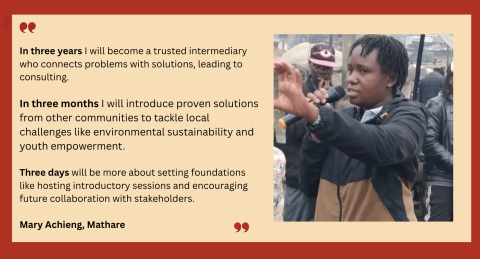
Many participants shared their visions for engaging their communities, particularly young people, in various activities to raise awareness and understanding of knowledge brokering and its importance to society. Vianne Abucheri from Kibera explained that; “In three years time I would like to have instilled knowledge brokering to the people of my community and the kids in our tech programme in the simplest form for the betterment of our community so as to be in the same place with information.” Florence Maina, Huruma added that in three year her, “community will be a great one because they will know more about knowledge brokering and more.”
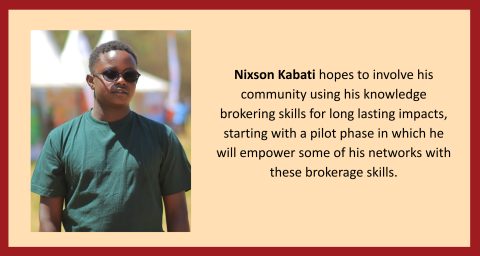
Some participants were specific in quantifying their objectives, with Elizabeth Were from Mathare stating that in three years she wants, “to have at least three achievements in terms of solving at least three problems in the community using the knowledge broker formula.”
While others left room for surprises. Felix Ochieng from Mathare explained that, “In the next three years, I would like to come up with a new innovation. Something that has never been done by anyone that can help improve the lives of people in my community.”
How will you get there over the medium and short term?
When considering what they would do in the three months following the workshop, everyone mentioned they would share the newly gained knowledge and skills with fellow members of their organisations, other young people and community-based organisations (CBOs) in their networks, families and friends, using some of the tools learned in the workshop (e.g., the ‘All hands on deck’ cards).
“I would ensure I interact with my community and also reach out to some of the stakeholders and ensure that they get to understand knowledge brokering as an aspect which is important to our people and get to know that when we have information, we have power.” Edinah Keya, Mukuru
Numerous participants shared their initial plans of building relationships with key players, such as different CBOs in their community, to identify and better understand barriers and decide which ones to address first and how, establishing a foundation for long-term knowledge exchange and collaboration. Stephen Odinga, from Mukuru, planned to begin by mapping and collecting data with key stakeholders “who have passion and are ready to join the journey of change we wish for in our community”. Others mentioned helping youth groups identify different stakeholders, and know how to reach out to and involve them in their projects. They noted that stakeholder mapping could assist in identifying and differentiating between those who need to be kept satisfied, those who need to be kept informed, those who require close management, and those with minimal contact.
Short-term plans remained practical and concrete, with participants emphasising the need to build and implement their action and work plans.
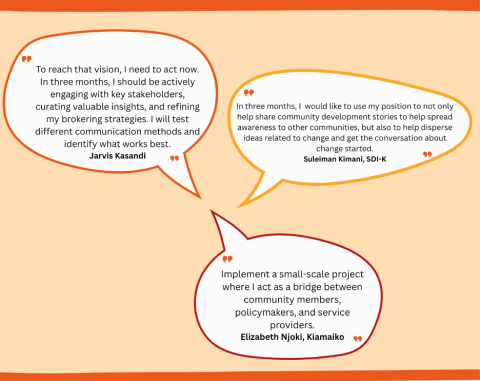
In light of the above, participants’ immediate plans for the three days following the workshop included revisiting and simplifying the materials and presentations, thinking deeply about how to use the new skills and knowledge, and conversing with their groups to see how they could apply the knowledge to inform new strategies and plans to improve their current projects. Bulenza Sirezi, from Uganda, shares his plans as follows:
“In three days, I should be learning online skills that impact the services I contribute to. I shall also ensure that I utilise my social media (i.e. X, Instagram, Facebook) and handle to share my motivation beyond SDI Kenya to ACTogether Uganda/National Slum Dwellers Federation Uganda.”
Whether in the next three months or three years, the participants of this workshop are committed to creating meaningful change, using knowledge brokering to co-create inclusive solutions to the challenges faced in their communities.
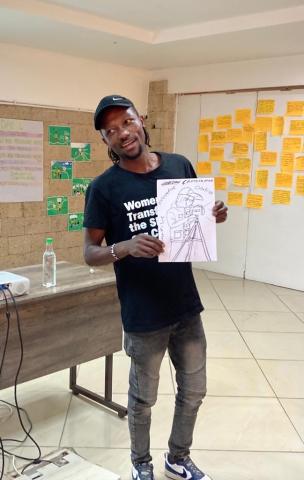
Dearest Julius Obisa (Obi), this blog is lovingly dedicated to you, our Muungano Wa Wanavijiji National Coordinator, devoted KYCTV member, mentor, and trainer. We thank you for your tireless passion, your active participation, and for capturing every moment through your photos and videos during the Muungano Youth Knowledge Brokering Workshop. You were always eager to learn, create, and uplift others.
Thank you for walking this journey with us and for helping shape who we are today.
The CDKN and SDI Kenya / Muungano Team
